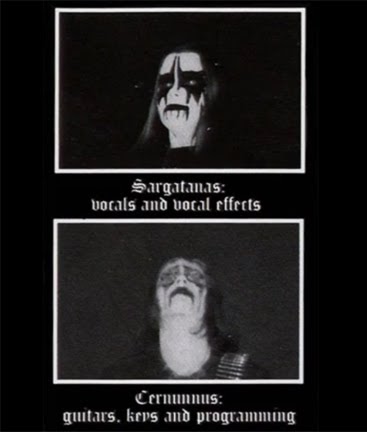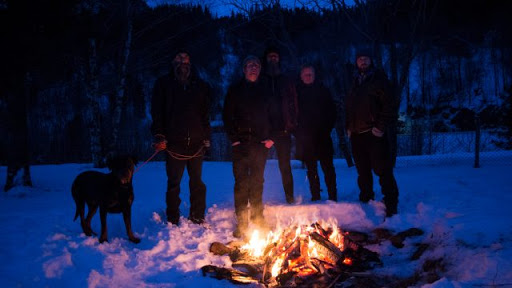
28 Feb “Purity and conservatism never appealed much to me.” An Interview with MANES Prime Mover, Tor-Helge Skei
As a supplement to our 45th episode (first aired
November 27, 2019, and always available), we present a Q&A with Manes’
Tor-Helge Skei. We said all we could possibly say about Manes in that episode,
so we’ll spare you a long introduction and get right to the meat of the matter.
Norway is the Best Way.

Radical Research: When you recorded your demos, your sound was already remarkably different than what was considered the “black metal” sound at the time. It begs the question: to what extent is black metal a sound or, rather, a feeling or approach to playing metal?
Tor-Helge Skei: Hmm…depends on who you ask, I guess. For me, it’s similar for all kinds of music, and art — purely the feeling, the atmosphere, what it’s doing to my head. For others it might be completely different. What is, and what is not black metal is kind of similar to discussing what is art or not. Personal opinions.
What was inspiring you, musically or otherwise, at the time of Under ein Blodraud Maane, since it came out at a relatively late time in the life cycle of the Second Wave?
At the time of its release, I was already pretty tired of “regular” metal, with all its unspoken rules and dogmas. Back then, I was listening to a lot more stuff than metal, and was obviously drawing inspiration from all of it, consciously or not. The demos were recorded in 1993-95, and after that there were a lot of health issues, and also, I got “occupied” with family life for some years. So, when I was about to record the first album, my mind and mental states had already wandered pretty far from where it used to be. And I actually found it a bit difficult to put myself into the right mindset to finish the album. But I finally got it done, and by then, I was sick and tired of it all.

We ask because, we wonder if you were already, at that time, starting to build the sound that would characterize 2003’s Vilosophe?
The “change” from Under ein Blodraud Maane to Vilosophe wasn’t really as abrupt as people think. On “the inside,” I had been messing with electronics and machine sounds for years and years. I actually messed around with computer music back in 1984-85, on a Dragon 32 computer, but that was more or less just a toy, and it didn’t get serious until I bought my first keyboard in ’90 or so. After that, I slowly started to find the distorted guitar a bit restrictive in possibilities and sound, so I experimented more and more with keyboards and samples and stuff, and things went from there.

What do you remember listening to in the late ‘90s? It was such an eclectic, open time, a time for metal bands to absorb influences from across the spectrum of music. Surely, the vastness of Manes’ music reflects an appetite for a wide variety of interests.
I always listened to things on the outer edges of the regular milieus. Purity and conservatism never appealed much to me. The more different and individualistic a band or artist is, the more interesting it usually is. I listened, and still do, to mostly “minor chords” music, songs and albums that have a personal, emotional part. And being different, or considered weird, was always a good thing. GGFH, Aphex Twin, Necromantia, Miranda Sex Garden, as well as the usual although mostly old-school stuff, like four-track (Necrohell) period Darkthrone, Mayhem with Dead, and some old thrash/death metal bands, Mefisto, Matricide, Derketa, Iron Warrior, and a bunch of the usual suspects: early Bathory, Sodom, Destruction, etc.
When you emerged in the 2000s with a remarkably different sound and lineup, what was your justification for keeping the name Manes? Usually there are clear steps from one evolutionary phase to the next to the next, but the shift from Blodraud Maane to Vilosophe might have seemed incredibly drastic to many ears. What made it Manes, for you?
A writer or a movie director doesn’t change his/her name between films/books, so why should a musician/band? It’s a strange thing in music, that if you release an album or whatever, your future is cemented, and from there on, the fans decide what is the correct music for the band. To be a Manes fan means you enjoy the uncertainties and changes, and want to be along for the ride. If not, you’re not really a fan of the band, even if you like one album…or something.
Geographically, Manes, being from Trondheim, was removed from the scenes in Oslo and Bergen. How did this apartness inspire your music? Did it give you a sense of freedom?
I think so. We weren’t very interested in the social aspect of it all, or the brand-building. We did our own thing, assuming nobody else was interested, and I think that made us “loosen up” a bit, and be individualistic and personal, like so many other bands from around here.
To some extent, Manes’ post-Under work is characterized by its urbanity. But in this music, we detect many of the same emotions that are expressed in the earlier Manes, just re-contextualized. Black metal often seems to yearn for retreat, taking to the forest or living inside of interior landscapes. Did the move to the more direct and cosmopolitan approach on Vilosophe allow you to confront things in a more direct way?
Not directly, or, I should say, not consciously. We always just made music we wanted to make, and didn’t really care much about what other people might expect or want from us. So if it became more “urban,” as you say, I guess it’s more because we started to listen to more and more “urban” music, and the influences crept into our music, subconsciously. We didn’t really sit down and talk about what kind of music we wanted to do, or the future direction of Manes.
Your lineup since Vilosophe has been quite steady, although several vocalists have
come and gone (and come back again). There were even a couple different lead
vocalists on Be All End All. Why is
the vocal position seemingly liquid and interchangeable within Manes? Or are we
looking at it the wrong way?
Ah, yeah, the vocalist spot has always been a bit chaotic. We’re not a regular band, with regular practices or meetings, except that it has been the same four people in the core of Manes for around 15 years or so now. We have been lucky enough to have quite a few good vocalists to work with. I don’t know, maybe the fact that we don’t see vocals as the “front” of a song, or any more important than the bass riff or drum pattern or whatever…it’s the sum of it all that counts. Maybe vocalists have a problem with that? Don’t know…don’t care. But vocals add a nice human touch to otherwise quite electronic and clinical programming.

If Manes began as black metal, and then moved quite far afield from it in the 2000s, and yet you and original Manes vocalist Sargatanas/Jenssen reunited to play black metal again later…why did you not call that Manes? Maybe you kind of did, calling it Manii, but still, we wonder.
Because I wanted to separate it from neo-Manes. I had already discovered that “other people” thought differently than me about all this band name thing (versus the director/author thing I mentioned above), and I also wanted to keep the two bands completely separate. Also for legal and contractual reasons.
Was anything ever recorded during the time you were known as kkoagulaa? Forgive our ignorance if something WAS recorded and released under that name…we haven’t come across it anyway. It’s an interesting period. Why the name change, and why back to Manes?
Yes, actually, kkoagulaa released one album called Aurum Nostrum Non Est Aurum Vulgi, as well as a digital EP called Impressions of Ardour. kkoagulaa was a bit different than Manes. Not a regular band, but more like an artistic collective, inspired and influenced by not just music but also other art forms like paintings, prose, and whatnot. The music is/was a kind of collage, or mash-up of aural bits and pieces, not traditional songs. The Aurum Nostrum album consists of one piece lasting for around an hour. kkoagulaa wasn’t Manes with another name, it was a separate project, consisting of me, and P. Emerson Williams (from Choronzon, Veil of Thorns, etc., now touring with Jarboe), but the other Manes guys stepped in and contributed bits and pieces.
There are so many weird and unusual and progressive-minded bands out of Norway who share similar roots in black metal as Manes. Virus, Dodheimsgard, Ulver, etc. The list goes on and you know all the other names. Why has the black metal movement of ’90s Norway stretched out into such an eccentric and multifold array of sounds?
Yeah, it’s a bit weird. I’ve always thought that the black metal explosion around 1992-94 here messed up things quite a lot. Very few of the early black metal bands did things to become popular or build a name for themselves, with some obvious exceptions, so when black metal was on everybody’s lips, and on the front of every single newspaper for months and months, people started to shy away from it. It became too clean and commercialized.
Is the preponderance
of the word/concept “end” deliberate in Manes’ work? What does
“end” mean for you? For instance: are finite things, things with
definite ends, inspiring in some way? Many might consider the end, with
absolutely nothing beyond it, a negative or pessimistic perspective. But doesn’t
the end of something give greater gravity to the thing that lived or existed in
the first place?
It’s quite personal, actually. I personally have lived “on the edge” for almost my entire life. Been very close to dying several times, had a few NDE’s (near death experiences), and generally, “the end” has been a part of my daily life for almost as long as I can remember. Not necessarily a negative thing.
What is going on in the Manes camp at the moment? When will we hear new music?
There’s a lot of stuff happening in the background, behind the scenes. In a couple of months , we will release a 7″ single and video. And a webshop where you can find a lot of rare and limited releases you can’t find elsewhere. And possibly an album with S.M.D.S. remixes. We are also working on a new album. Can’t say much about it yet, as it’s very “work in progress” and things have a tendency to change a lot during the process. Also, somewhat Manes-related, I’m working on a new “secret” project with some guys from around here, in Trondheim, and I’ve been talking with Anna about a new Lethe album. Apart from making new music, we are also preparing for some live shows later this year. We were supposed to play some gigs during 2019, but because of my diseases and surgery and other crap, it was postponed ’til this year. Two appearances are confirmed so far: Progpower (Europe) and Brutal Assault. I am also thinking about doing some old-Manes black metal gigs, if I can find the right people to play with. So, things are pretty hectic around here now.



